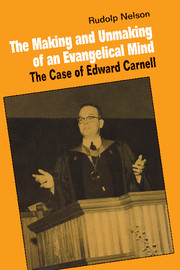VIII - Apologetics of the heart: the perspective of inwardness
Published online by Cambridge University Press: 10 December 2009
Summary
In The Temptation to Exist, the French philosopher E. M. Cioran said, “We never follow the consistent rationalist for long; once we pluck out his mystery and know where he is headed, we abandon him to his system.” After the cold and somewhat sterile rationalism of An Introduction to Christian Apologetics, Edward Carnell seemed to experience this sort of dissatisfaction within himself. His second major work of apologetics, A Philosophy of the Christian Religion, published in 1952, developed a defense of Christianity based on the broader category of values and began with the claim that “religion starts whenever an individual is willing to name a value for which to live and die.” He designated clearly the limited role of reason and logic in this quest:
It is the scholastic, not the Biblical writer, who is responsible for the definition that man is a rational animal. Scripturally, man is a sentient creature qualified to worship God. Man releases his best powers when he enjoys communion and fellowship, not when he perceives rational connections in a formal syllogism.
(179)Put another way, for the whole person satisfaction must involve more than reason's “knowledge by inference”; it also entails “knowledge by acquaintance,” a category that includes knowledge of persons as well as places and things, and that enjoys its ultimate fulfillment in knowledge of God. Carnell called this angle of vision “the perspective of inwardness” and said that Kierkegaard taught him how to use it:
Without the stimulation of the Danish gadfly, I probably would never have learned how to ask questions from the perspective of inwardness. It is a pleasure to acknowledge my indebtedness to Kierkegaard.
(CC 73)- Type
- Chapter
- Information
- The Making and Unmaking of an Evangelical MindThe Case of Edward Carnell, pp. 151 - 178Publisher: Cambridge University PressPrint publication year: 1988



